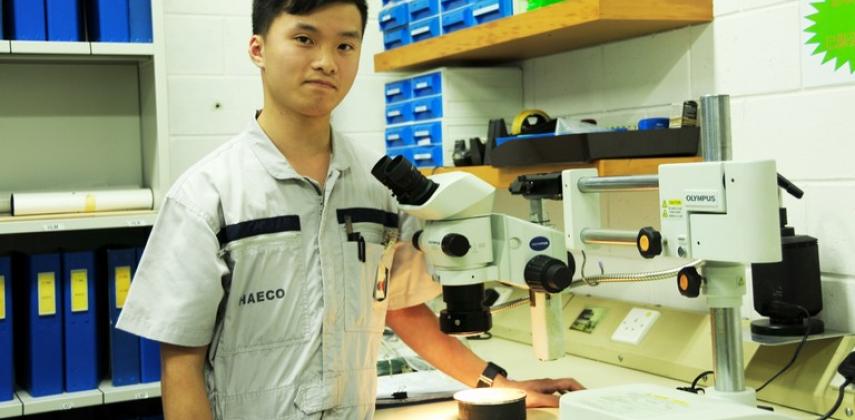Aircraft engineering may be described as a specialised industry, but in Hong Kong at least, it is also one which is large, steadily expanding, and offers a wide range of entry points and career paths. All that helped convince Lau Yuen-keung to leave the limited prospects in his previous job and join HAECO as an aircraft maintenance craftsman trainee (AMCT) in 2008. Tipped off about the opportunities by a friend, he saw the sense in learning new skills, obtaining professional qualifications, and making the most of his talents.
Now an approved maintenance technician (AMT) responsible for conducting transit checks and defect rectification on aircraft, Lau started as a trainee in the airframe-maintenance department. There he received on-the-job instruction in theoretical and operational matters, model-specific training, and got the chance to work on various aircraft.
He also took courses to improve his English and studied for a higher diploma in aircraft maintenance at the Institute of Vocational Education (IVE).
“I am very happy in my current role and have even been asked to do troubleshooting work outside Hong Kong,” says Lau, who recently handled an ad hoc engine swap for an airline customer in Beijing. “Some projects are under tight time pressure, but my aim now is to get the certification to work on more aircraft and engine types and to complete my mechanical engineering degree at Hong Kong Polytechnic University.”
Jeffery Yuen Ka-chung, a craftsman in HAECO’s non-destructive testing team, is similarly positive about his career choice. His main duties involve carrying out X-ray, ultrasound and eddy-current tests on various aircraft parts.
Yuen took an aircraft maintenance diploma in vocational studies in Kowloon Bay and joined HAECO, aged 19, in 2010. Taking the company’s one-year AMCT programme in his stride, he is now completely in his element.
“Through the on-the-job training, I now understand the complex structure of an aircraft and the precision required to conduct any testing procedures. I am also getting the accreditation needed to advance my career,” Yuen says.
The next step is to become a tradesman and – when suitably qualified and experienced – approved technician, supervisor and then ultimately, an aircraft engineer.


